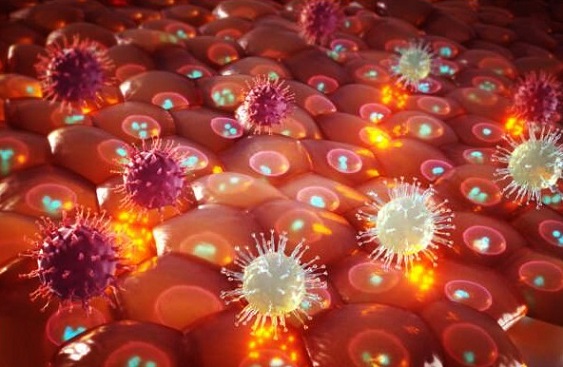Nikhil Prasad Fact checked by:Thailand Medical News Team Aug 31, 2025 5 months, 3 weeks, 2 days, 20 hours, 53 minutes ago
Medical News: Two Viruses Working in Dangerous Ways
A team of researchers from the Third Affiliated Hospital of Southern Medical University, China; Integrated Hospital of Traditional Chinese Medicine, Southern Medical University, China; Al-Qadisiyah Education Directorate, Iraq; Albaydha University, Yemen; University at Buffalo, The State University of New York, USA; and Al-Muthanna University, Iraq has highlighted the serious risks when the Epstein-Barr Virus (EBV) and COVID-19 overlap inside the human body. EBV is already a well-established cancer-causing virus, while COVID-19 has been shown to disrupt the immune system in ways that may create fertile ground for cancer to develop. In this
Medical News report, it becomes clear that the combination of the two viruses creates a “dual threat” that may drive cancers to form or progress faster than expected.
 EBV and COVID-19 Together Raise Hidden Cancer Risks
Epstein Barr Virus - A Known Cancer Driver
EBV and COVID-19 Together Raise Hidden Cancer Risks
Epstein Barr Virus - A Known Cancer Driver
EBV is one of the most widespread viruses in humans, infecting up to 95 percent of people worldwide. It often causes no obvious illness but is infamous for causing “mono” or the kissing disease in teenagers and young adults. More worryingly, EBV is strongly linked to several cancers, including nasopharyngeal carcinoma (NPC), Burkitt lymphoma, Hodgkin lymphoma, and some gastric cancers. The virus achieves this by hiding inside immune B-cells, altering their behavior, and reactivating when immunity is weak. Once active, EBV can force cells into endless division, trigger genetic damage, and weaken the body’s natural tumor surveillance system.
COVID-19 as a Possible Carcinogen
While SARS-CoV-2, the virus behind COVID-19, is not officially labeled as an oncogenic virus, the new findings suggest it may play a hidden role in cancer.
Severe or long-lasting COVID-19 leads to persistent inflammation, immune exhaustion, and dangerous cytokine storms. These changes can damage tissues, lower immune defenses, and allow viruses like EBV to awaken from their dormant state. This prolonged immune disruption creates an environment similar to what is seen in cancer-promoting conditions, suggesting that COVID-19 itself may act as a cancer accelerator in vulnerable groups.
When EBV and COVID-19 Combine
The real danger comes when both viruses act together. COVID-19 weakens T-cells, B-cells, and natural killer cells that normally control EBV infections. This lack of surveillance allows EBV to reactivate freely, and reactivated EBV in turn worsens inflammation. This vicious cycle can accelerate the growth of tumors associated with EBV, especially in patients already immunocompromised. The researchers describe how shared mechanisms—chronic inflammation, immune suppression, and viral reactivation—intertwine to create a tumor-promoting environment. They warn that this combined viral effect could explain worse cancer outcomes and higher risks of cancer relapse in the pandemic era.
Implications for Treatment and Prevention
Beyond the biological risks, the COVID-19 pandemic also disrupted cancer screening and delayed timely treatments worldwide. For patients with EBV-linked cancers, these delays were particularly harmful. The researchers stress the need for integrated medical approaches that simultaneously address viral infections and cancer treatment. They also highlight the promise of immunotherapy, antiviral drugs, and new diagnostic biomarkers that could track EBV reactivation in COVID-19 patients.
Conclusion
This new evidence underlines that the story of COVID-19 does not end with respiratory illness. Its long-term effects on the immune system may have opened the door to more cancers, especially when paired with the already dangerous Epstein-Barr virus. The study makes it clear that both viruses together form a silent but potent threat. Future medical strategies must recognize this link, improve screening for viral reactivation in cancer patients, and adapt treatments accordingly. Only by addressing both infections at once can doctors hope to reduce cancer risks and improve survival outcomes.
The study findings were published in the peer reviewed journal: Viruses.
https://www.mdpi.com/1999-4915/17/9/1195
For the latest COVID-19 News, keep on logging to Thailand
Medical News.
Read Also:
https://www.thailandmedical.news/news/scientists-from-finland-warn-that-sars-cov-2-may-trigger-cancer-in-a-manner-similar-to-other-oncogenic-viruses
https://www.thailandmedical.news/news/covid-19-virus-could-be-behind-alarming-rise-in-rare-cancers-like-gastrointestinal-stromal-tumors
https://www.thailandmedical.news/news/new-study-shows-that-epstein-barr-virus-reactivation-and-low-cortisol-levels-are-common-in-many-long-covid-patients
